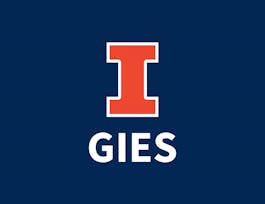The last three or four decades have seen a remarkable evolution in the institutions that comprise the modern monetary system. The financial crisis of 2007-2009 is a wakeup call that we need a similar evolution in the analytical apparatus and theories that we use to understand that system. Produced and sponsored by the Institute for New Economic Thinking, this course is an attempt to begin the process of new economic thinking by reviving and updating some forgotten traditions in monetary thought that have become newly relevant.


Economics of Money and Banking
Taught in English
Some content may not be translated
164,594 already enrolled
(1,553 reviews)
Details to know

Add to your LinkedIn profile
12 quizzes
See how employees at top companies are mastering in-demand skills


Earn a career certificate
Add this credential to your LinkedIn profile, resume, or CV
Share it on social media and in your performance review

There are 13 modules in this course
The first two lectures paint a picture of the monetary system as the essential infrastructure of a decentralized market economy. The second lecture, "The Natural Hierarchy of Money", is a kind of high-level overview of the entire course, so don't expect to fully understand it until you look back after completing the rest of the course. Nevertheless it provides essential orientation for what comes after. Lectures notes for these and subsequent lectures may be found in the very first segment of this module.
What's included
12 videos2 readings
The next two lectures are meant to introduce a key analytical tool, the balance sheet approach to monetary economics, that we will be using repeatedly throughout the course. As inspiration, first I provide a concrete example of how the approach works by "translating" the Allyn Young reading into the balance sheet language. I follow that with a more systematic introduction to this essential tool.
What's included
20 videos1 reading1 quiz
In the next four lectures, we build intuition by viewing banking as a payments system, in which every participant faces a daily settlement constraint (a survival constraint). From this point of view, the wholesale money market plays a key role by allowing banks to relax the discipline of a binding settlement constraint, delaying final payment by putting settlement off until a later date. The relative importance of the various money markets has changed since the 2008 crisis--Fed Funds is now less important--but the conceptual framework remains valid, indeed not only for dollar money markets but also for non-dollar money markets.
What's included
20 videos1 reading1 quiz
The next two lectures extend the payments system frame to non-banks by bringing in repo markets, and to the international monetary system by bringing in Eurodollar markets. Here, as in the previous two lectures, the emphasis is on settlement, and so implicitly on so-called "funding liquidity". The last three segments of the Eurodollar lecture, on the failure of two seemingly obvious arbitrage conditions, are meant to motivate the shift to market-making and "market liquidity" in the next module.
What's included
20 videos1 reading1 quiz
"Market liquidity" is supplied by dealers who stand ready to absorb temporary imbalances in supply and demand by taking the imbalance onto their own balance sheets, for a price. From this point of view, banks can be considered a special kind of dealer, since they absorb imbalances in payment flows. The first lecture is meant to build intuition by using our familiar balance sheet method to make sense of how this all worked in a system much simpler than our own. The second lecture introduces a formal model of the economics of the dealer function, which we will be using throughout the rest of the course.
What's included
16 videos1 reading1 quiz
Here we adapt the Treynor model to banks, which we conceptualize as dealers in money, specifically term funding. Like Treynor's security dealers, banks supply market liquidity for a price. But sometimes, in a financial crisis, demand for market liquidity overwhelms supply, and that's where the central bank comes in, as dealer of last resort in money markets. And if the crisis is big enough, as 2007-2009, the central bank comes in as dealer of last resort in capital markets as well.
What's included
16 videos1 reading1 quiz
The first twelve lectures have introduced all of the main concepts of the course. The midterm exam gives you a chance to test whether you have mastered these concepts before extending them into new areas in the second part of the course. But before you try the exam, first use the review lecture, and the questions from students, to review the main concepts.
What's included
10 videos1 quiz
The next four lectures extend the "money view" perspective to the larger world of multiple national monies by thinking about the international monetary system as a payment system, and by thinking of banks as market makers in foreign exchange. The first lecture is introductory and conceptual, while the second builds intuition by "translating" Mundell's account of the development of the international monetary system into money view language (similar to what we did at the beginning of the course for Allyn Young's account of the development of the US monetary system).
What's included
18 videos1 reading1 quiz
The next two lectures use the Treynor model to understand how exchange rates are determined in dealer markets. In the second, we confront directly the puzzle we observed earlier in the course, namely why uncovered interest parity (UIP) fails to hold in real world markets.
What's included
15 videos1 reading1 quiz
The next four lectures extend the money view to the larger financial world of capital markets, where the price of risk is determined in dealer markets for swaps of various kinds. The first lecture is a kind of conceptual introduction, while the second translates the standard finance account of forwards and futures into money view terms, as key building block for what comes after.
What's included
19 videos1 reading1 quiz
In the modern economy, the price of risk is determined in swap markets that distinguish specific forms of risk, most importantly interest rate swaps and credit default swaps. The Treynor model can be adapted to understand how the price of risk is formed in dealer markets.
What's included
19 videos1 reading1 quiz
In this final module, we bring the entire course together. These two lectures build on everything that came before, and show how all the pieces fit together into a unified whole. Specifically, the first lecture uses the conceptual apparatus of the money view to make sense of shadow banking as the quintessential form of banking for the modern financially globalized world. And the second lecture shows how the conceptual apparatus of the money view fits with standard economics view and finance view, by drawing attention to dimensions of the world from which the standard views abstract.
What's included
17 videos1 reading1 quiz
The previous module operated in effect as a review of the entire course, so if you were able to make sense of those lectures, you are ready for the final. But maybe you first want to have a look back at the second lecture, "The Natural Hierarchy of Money", for a high-level summary of the essential concepts of the money view. For almost everybody, the money view is a new and unfamiliar way of thinking about the world, and it takes a while to get used to it. The purpose of this course is to plant the seed, by demonstrating the value of this way of thinking for making sense of real world problems. Once you are done with the final exam, the real work begins, of using the money view to make sense of whatever real world problems confront you in your own daily life.
What's included
1 quiz
Instructor

Offered by
Recommended if you're interested in Economics

University of Illinois at Urbana-Champaign

University of Illinois at Urbana-Champaign

Google Cloud

Coursera Project Network
Why people choose Coursera for their career




Learner reviews
Showing 3 of 1553
1,553 reviews
- 5 stars
90.08%
- 4 stars
7.59%
- 3 stars
1.09%
- 2 stars
0.38%
- 1 star
0.83%

Open new doors with Coursera Plus
Unlimited access to 7,000+ world-class courses, hands-on projects, and job-ready certificate programs - all included in your subscription
Advance your career with an online degree
Earn a degree from world-class universities - 100% online
Join over 3,400 global companies that choose Coursera for Business
Upskill your employees to excel in the digital economy
Frequently asked questions
Access to lectures and assignments depends on your type of enrollment. If you take a course in audit mode, you will be able to see most course materials for free. To access graded assignments and to earn a Certificate, you will need to purchase the Certificate experience, during or after your audit. If you don't see the audit option:
The course may not offer an audit option. You can try a Free Trial instead, or apply for Financial Aid.
The course may offer 'Full Course, No Certificate' instead. This option lets you see all course materials, submit required assessments, and get a final grade. This also means that you will not be able to purchase a Certificate experience.
When you purchase a Certificate you get access to all course materials, including graded assignments. Upon completing the course, your electronic Certificate will be added to your Accomplishments page - from there, you can print your Certificate or add it to your LinkedIn profile. If you only want to read and view the course content, you can audit the course for free.
You will be eligible for a full refund until two weeks after your payment date, or (for courses that have just launched) until two weeks after the first session of the course begins, whichever is later. You cannot receive a refund once you’ve earned a Course Certificate, even if you complete the course within the two-week refund period. See our full refund policy.


